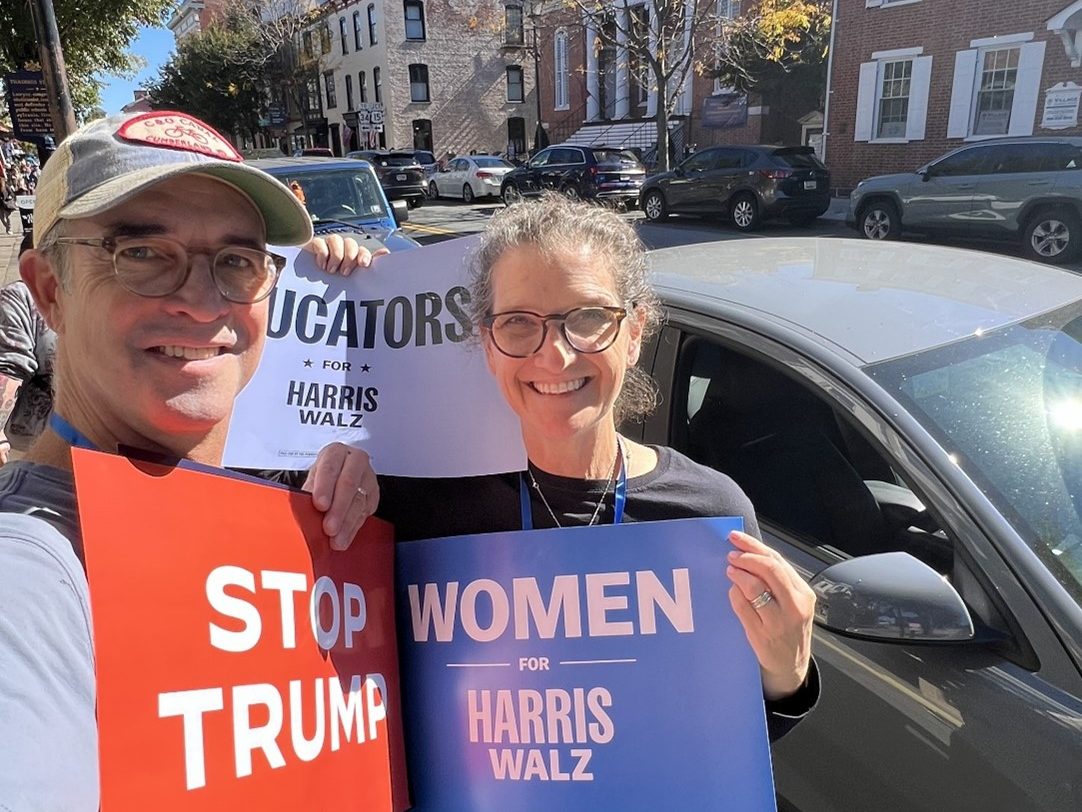On a brisk Saturday morning in October, amid the historic sites and small businesses of Gettysburg, Penn., 40 people were gathered in a small office space.
All were from Maryland, but these weren’t tourists seeking Civil War tales or you-pick apple orchards. They were politically active voters who wanted to help tilt the election in perhaps the most important swing state of all, where polls show a toss-up in the presidential race.
Maryland almost always lives up to its deep-blue reputation – Joe Biden bested Donald Trump here by more than 33 percentage points. So volunteers who want to make a difference often take the short drive north over the Mason-Dixon line to go door to door or work phone banks.
Among those inside the Adams County Democratic Party office were Rob and Meredith Gramlich. The Bethesda couple first campaigned for President Obama more than a decade ago. They chose to travel to Pennsylvania in 2024 rather than volunteer for Democratic candidate Angela Alsobrooks in the Maryland Senate Race.
“It’s tough to have any influence in Maryland,’’ said Rob Gramlich, 55, president of an energy consulting firm. For the Gramlichs, it is more important to focus on the “bigger picture,” meaning the presidential race and swing state voters.
Volunteers like the Gramlichs are essential to produce a high-energy day of canvassing, said Casey Deck, lead organizer for the Pennsylvania Democratic Party in Adams County.
“Last weekend, we reached 19,000 doors. This weekend, we’re aiming for 28,000,” he said, a number that would only be possible with out-of-state help.
Refining the script
On this Saturday, Deck told the volunteers they would be focusing on Democrat, independent, and some third-party voters.
“There are very few Republicans that will swing blue,” Deck said, explained why they avoid the homes of registered Republicans.
With route assignments in hand, the volunteers traveled into town. Each group followed a concise, three-question script: “Are you aware of the election? Do you have a plan to vote? And are you aware of the down-ballot Democratic candidates?”
Their routes took them to manicured neighborhoods near Gettysburg College, where they encountered multiple Harris-Walz signs on lawns along streets like West Broadway and West Lincoln Ave—a strong show of local support.
As they moved from house to house, the Gramlichs relied on an app created for canvassers to track their progress, marking each interaction down. The first task involved knocking on 23 doors, home to 39 potential voters.
“It’s about chunking the talking points,” said Meredith Gramlich, 56, who works at the University of Maryland College of Education. She explained her plan to keep the script conversational, not robotic, while covering key policy areas in the Harris-Walz campaign.
The Gramlichs left literature behind at homes where no one answered. They also received two confirmations that mailed-in ballots were submitted with only Democrats names checked, and they secured four confirmations of voters planning to vote on Election Day.
The same afternoon, Daniel Corbett, a Silver Spring retiree, was walking in Hanover, a working-class town located about 30 minutes outside of Gettysburg with a notable abundance of ‘Steelworkers for Harris’ signs in yards.
‘Out of my comfort zone’
The Hanover canvassing office was an empty warehouse, subleased for the election season. It was full of life, buzzing with volunteers from New Jersey as well as Pennsylvania residents, and those volunteers from Maryland. Corbett dressed for the occasion, sporting a new “White Dudes for Harris” hat.
Corbett’s day included four ‘lit drops’, three confirmations of mail-in ballots already cast, and two voters planning to vote on Election Day.
One interaction stuck out: Corbett approached a man in his driveway while the man was working on his boat. The man told Corbett he had already voted for Trump.
“I’m sorry to hear that,” Corbett told the man, who quickly shot back, “No, I would be sorry for her,” referring to the Kamala Harris hat Corbett was wearing.
Still, Corbett’s resolve wasn’t shaken. He saw canvassing as a personal mission, one made more poignant by his wife’s reaction to the Trump administration.
“She felt disregarded,” he confided, explaining that the 2016 results affected them in ways they hadn’t anticipated.
As the day wore on, one of the most meaningful conversations came from an unexpected source. Bonnie Reese, a lifelong steelworker, opened up to Corbett during his visit. Reese, who had already made up her mind to vote for Harris-Walz, shared her growing frustration with the political divide in her own family.
“I’ve always respected Republicans,” she began, “But now, it’s a shame that I have family members who’ll no longer talk to me.”
Still, she is optimistic for the future.
“There’s a ladder to climb, and this is the best bet,” she said, referring to the Harris-Walz ticket.
Both Vice President Kamala Harris and former President Donald Trump have made multiple visits to Pennsylvania in the final weeks of the campaign.
Deck, the Democratic campaign coordinator for Adams County, said it was important for his party to pull its weight in the race for the White House, even if it meant bringing in volunteers from across state lines.
“I’m out of my comfort zone, but this is necessary for me to do,” Corbett acknowledged, adding that the 2016 election had left him with deep regrets. “After Hillary lost, I was depressed. I felt like I didn’t do enough to impact the campaign.”



